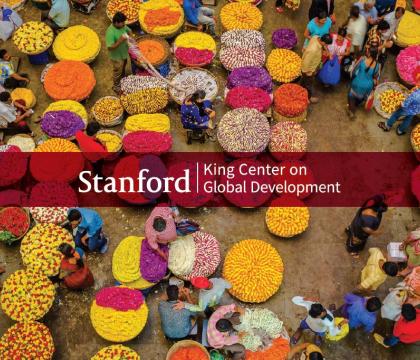2020-21 Spring Quarter Junior Faculty Research Grants for Global Development Work
The Stanford King Center on Global Development invites proposals from Stanford junior faculty for small projects or for seed funding of projects that, if successful, have the potential to equip the investigators to write credible research proposals for other funding sources based on the initial results.
This request for proposals is open to Stanford junior faculty performing new research on topics relevant to global development and poverty. Proposals will be accepted and considered twice yearly, in January and June.
Expected seed funding for each project is up to $80,000 per project.
The Stanford Center on China's Economy and Institutions (SCCEI) provides additional funding through this mechanism to support research focused on China.
Application deadlines for the 2020-21 academic year are Monday, January 11, 2021 and Monday, June 7, 2021.
RFP Scope:
The proposed work may involve the broad range of disciplines involved in global development, including but not limited to earth sciences, economics, engineering, medicine, political science, policy, individually or in combination.
Proposals for which this additional funding for the proposed research would be incremental to funding already available, or for which the research is already sufficiently advanced to be a good candidate for other funding, are less likely to be selected.
Proposal Submission, Review, and Award Process:
Proposal Submission
Full proposals (format and submission instructions described below) should be submitted through the Stanford Seed Funding website. Proposals must be self-contained with no links to additional information. Proposed budgets need not be routed through OSR for this internally-funded research initiative.
Proposal Format
- The proposal is subject to a five-page limit with fonts no smaller than 11-point. This includes the text, figures, tables, and references. In the proposal, please answer the following questions:
- What is the global development issue you are hoping to address?
- What is the study context?
- How will you organize the research effort so as to answer your question with a high level of confidence? Research design elements to consider include (but may not be limited to) sampling strategy, kinds of comparisons you plan to make, data sources and methods, timing of data collection, how you propose to deal with potential threats to sound inference (e.g., confounding and bias).
- How will the project contribute to the academic literature? What is the potential for policy impact?
- What is anticipated timeline (provide both the optimistic and pessimistic scenario)?
- The budget and budget justification are limited to two additional pages.
- Each Principal Investigator who will be associated with the proposed work should submit a CV.
Expected funding for each proposed project is up to $80,000 (the 8% university infrastructure charge will be paid by the King Center).
Summer salaries are excluded from funding for faculty with 9-month “hard money” appointments. Our selection committee has been sympathetic to allowing salary support for faculty on “soft money” who have the requirement of raising their salary (like medical school faculty).
Projects will be funded for a period of performance of up to one year. One no-cost extension for the duration of up to one year past the original end date of the award may be requested. Follow-up funding in subsequent years is not anticipated.
The source of funding is gift funds; therefore, no proposal may include indirect costs, even if non-Stanford investigators would complete some part of the project. Projects will be funded through a newly created gift project task award (PTA); the 8% infrastructure charge for the award will be paid directly by the King Center.
Proposal Review
The objective of the review process is to identify high quality projects that are consistent with the goals of this solicitation. Proposals will be reviewed by a committee that will apply a general filter for alignment with the general themes of global poverty and development, and then use the following criteria to evaluate the proposals: (1) innovation, (2) academic rigor, and (3) whether the budget is commensurate with the value of the proposed research.
Committee members who are involved in a proposed project will recuse themselves from discussions of the relevant proposals. The committee may be supplemented by other faculty and experts with knowledge related to the areas of research but who are not involved in the proposed projects. The opinions of additional experts at Stanford or outside of Stanford may be sought, with the requirement that the reviewer maintain the confidentiality of the proposed work.
Awards
It is anticipated that funding decisions based on this solicitation will be announced approximately two months after proposal submission deadlines.
Eligibility for Funding
Please note that the primary Principal Investigators (PIs) must be Stanford junior faculty members with one of the following appointment types:
- Regular tenure-line faculty (UTL/University Tenure Line, Assistant Professor or untenured Associate Professor)
- MCL (Medical Center Line) faculty (Assistant Professor)
Clinician Educators (Clinical Educator line), Clinical Professors, and Instructors are not eligible to receive Stanford Junior Faculty Research Grants from the Stanford King Center on Global Development. If you have one of these appointments, but will be transitioning into an eligible faculty appointment as indicated above, please indicate this and include your appointment letter (showing that you will become an eligible faculty member during the initial year of project funding) when you submit your application.
Please note that consulting faculty, postdocs, academic staff, etc., are not eligible to apply.
Full proposals (format and submission instructions described above) should be submitted through this Stanford Seed Funding website. Proposed budgets need not be routed through OSR for this internally-funded research initiative. Proposals must be self-contained with no links to additional information.
Up to $80,000 per project (the 8% university infrastructure charge will be paid by the King Center).
